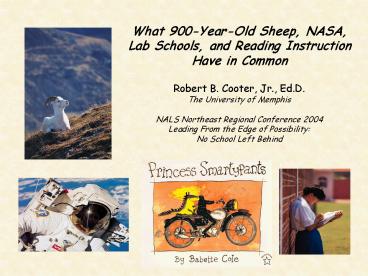What 900YearOld Sheep, NASA, PowerPoint PPT Presentation
1 / 20
Title: What 900YearOld Sheep, NASA,
1
- What 900-Year-Old Sheep, NASA,
- Lab Schools, and Reading Instruction
- Have in Common
- Robert B. Cooter, Jr., Ed.D.
- The University of Memphis
- NALS Northeast Regional Conference 2004
- Leading From the Edge of Possibility
- No School Left Behind
2
A Lab School with an Urban Mission
3
Urban Literacy Challenges
- Poverty Related Issues
- High Student Mobility
- Language Development Deficits
- Nutrition Health Issues
- Attendance Problems
- School District Challenges
- Leadership Capacity
- Teacher Longevity
- Accountability Stress (NCLB)
- Community Perceptions
4
Change?
- We trained hard but it seemed that every time
we were beginning to form up into teams we were
reorganized. I was to learn later in life that we
tend to meet any new situation by reorganizing,
and what a wonderful method it can be for
creating the illusion of progress while actually
producing confusion, inefficiency, and
demoralization. - -- Petronius Arbiter, 210 B.C.
5
Sponsors Are Critical
- University Support
- Full endorsement by School Board Members
- Transcended four Superintendents in four years
- Involvement of Philanthropy
- Involvement of Political Community Leaders
6
(No Transcript)
7
Change Involves Data Collection A NASA
Approach
Family/Community Involvement
Student Assessment
Knowing the Skills
GOAL
Program Quality Management drives effective
implementation
All children in the Dallas Public Schools will
achieve grade level reading in their language of
instruction by the end of the third grade.
MANAGEMENT SYSTEM
Special Needs Students
Teacher Training
8
The Dallas Experiment Putting the Pieces
Together
- Teacher Capacity Implementing Research-Based
Teaching Practices - A Principals Fellowship for School Leaders
- Community Involvement
9
A Capacity-Building Model for Teacher
Development (Cooter Cooter, 2003)
Expertise Ability to Coach Others
Refined and Expanded Capacity
Practice with Coaching
Deeper Learning with Limited Capacity
First Exposure
No Knowledge
10
The Role of Starpoint School
- An research laboratory in which everything we
know is implemented, studied, and improved before
large scale implementation
11
Balanced Literacy K-6
- INSTRUCTIONAL METHODOLOGIES
- WITHIN A LANGUAGE RICH ENVIRONMENT
- Classroom Management
- Room Arrangement
WRITING
READING
- Mini lessons
- Phonemic awareness
- Alphabetic Principle
- Elkonin boxes
- Word Study
- Mini lessons
- Spelling stages strategies, word work, making
words, mechanics, word walls - Handwriting
Skills Instruction and Practice
- Teacher read alouds
- Language to Literacy Charts
- Shared Reading/warm-ups
- Concepts about print
- Cueing systems
- Text Structure
- Comprehension Workshop
- Retelling
- Writing aloud
- Morning Message
- Daily News
- Model process writing
- Graphic organizers (Go Charts)
- Book extensions
Oral Reading/Writing
- Guided reading
- Teacher prompts
- Teaching points
- Running Records
- Silent Reading
- Reading for meaning
- Fix-up strategies
- Readers Workshop
Instructional Level Reading/Writing
- Guided writing
- Writers workshop
- Writing Process
- Genre Study
- Writing/literacy centers
- Journals/Response logs
- Writers Notebook
- Book making/extensions
- Independent writing
Independent Reading/Writing
- Book boxes
- SSR/DEAR time
- Reading/Literacy centers
- Buddy reading
- Literature circles/Book clubs
- Inquiry/Research
- Writing stages
- Interactive writing
- Shared writing
Developmental Writing
- Authors chair/group sharing
ONGOING ASSESSMENT (TPRI/TEJAS LEE K-2, DSP
3-6, DLP/PLED K-3)
12
Helping the Saints
- Training philosophy Bring Teachers up to
Expertise - Contrasts with purchased programs in Houston,
St. Louis, Philadelphia - Analogy teach a man to fish
- Pros and cons of two approaches
13
The Principal Connection
- Selected Topics in the Principals Fellowship
included - Creating Sustaining School-wide Reading
Programs - Creating Literacy Materials Centers
- The Power of Lab School Research
- Early Identification of Children with Needs
- Intense/Focused Remediation
- Research-Informed Decision Making
- Involving Families
- Needs-Based Scheduling
- Matching the Most Successful Teachers
- with Critical Condition Kids
14
Involving Families Community(see Strategies
text, Ch. 16, p. 439)
- Reading Backpacks
- Volunteers
- Refrigerator Reading
- Information Videos
- Adult Literacy
- Family Projects
- Summer Reading
15
Results
- 446 K-3 Laureates - 1999
- 728 K-3 Laureates - 2000
- 1,015 K-12 NJWP Teachers Trained
- 18 Reading Recovery Teachers Trained
16
Teacher Testimonials
My students have developed a love for words and
writing! We have published three class books so
far. As a result, from my attending the academy
classes, my students will be ready for 4th grade
TAAS writing next year. Come by and visit us. We
love writing!!! --Linda Blackshear, Hawthorne
Elem.
As a veteran teacher, I quickly realized that the
fall course served as a catalyst for my children
and me. It was a rebirth of a lot of things that
I had learned years ago but had gradually
abandoned. However, the Reading Academys
presentation showed me how to revamp and create a
balanced literacy program in a fun and
educational way. --Paulette Cody, Carr Elementary
I am so glad that I endured all of the hard work
last semester, because I would not trade my
students reading successes for
anything! --Andrea James, Tyler Elementary
17
3rd Grade TAAS TLIs Spring 2000
AVERAGE TLIs
18
Suggested Issues for Lab School Partner Research
- Reform of Teacher Preparation Programs
- Fragmented Reading Instruction
- Resources Dearth of Teaching Materials
- Testing SBRR Strategy Combinations
- The Role of Technology
- Teaching Slow Learners
- Preparation of Instructional Leaders New Models
19
- Story of
- The 900-Year-Old Sheep
20
For more information online
- Free resources umdrive.memphis.edu/rcooter/public
/ - E-mail kcooter_at_memphis.edu

